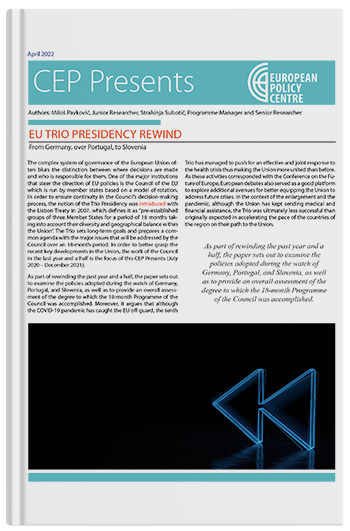Headquarters: Svetog Nauma 7, 11000
Office address: Đorđa Vajferta 13, 11000
Phone:: +381 11 4529 323
In the wake of Russian aggression against Ukraine, the intricate game of geopolitical considerations has prompted the EU to recalibrate its approach to enlargement. This recalibration has not gone unnoticed in the Western Balkans and former Eastern Partnership countries, where anticipation hangs in the air. Expectations are large, yet the undeniable truth lingers: the EU must reform its institutional groundwork for enlargement to materialise.
Against this backdrop, Charles Michel, the President of the European Council, has cast a hopeful gaze towards 2030 as a target date when the EU should complete its internal reforms to become enlargement-ready. Simultaneously, candidate and potential candidate countries are urged to amplify their reform efforts. Brussels remains resolute – any progression towards membership will be merit-based, with an unwavering commitment to the rule of law. As the anticipation builds, all eyes turn to the 2023 Enlargement Package so as to see what the Commission has to say about the progress of respective countries, while also accounting for the Commission’s new Growth Plan for the Western Balkans.
In that context, CEP organised a webinar titled ‘Discussing the 2023 Enlargement Package and the Functioning of Democratic Institutions in the Western Balkans,’ inviting its regional partners from the Think for Europe Network (TEN) to participate. The event featured the participation of the Ambassador of Italy to Serbia, H.E. Luca Gori, as well as Mr Ger Jan Koopman, the Director-General for European Neighbourhood Policy and Enlargement Negotiations. The event had two primary objectives. Firstly, it served as a platform to delve into the EU’s 2023 Enlargement Package and the current state of the accession process in the Western Balkans. Esteemed experts from each WB country shared their insights and perspectives, contributing to a comprehensive understanding of the region’s path forward. Secondly, the webinar presented the results of CEP’s research, which scrutinised the Commission’s methodology for evaluating the Functioning of Democratic Institutions (FoDI) across the region. This research and webinar were made possible with the support of the Ministry of Foreign Affairs and International Cooperation of Italy.


